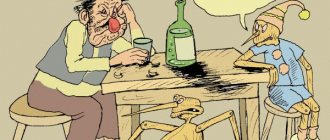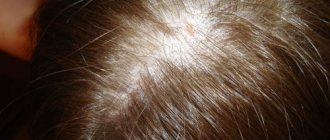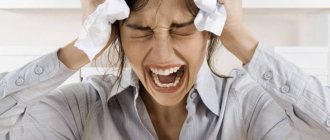Content:
- 1 Stress as an excuse to drink
- 2 How alcohol and stress interact
- 3 Can alcohol help with depression?
- 4 Does alcohol increase nervousness?
- 5 Does the condition change when drinking alcoholic beverages?
- 6 How to relieve depression without alcohol
- 7 Conclusion
When a person realizes that stress subsides when drinking alcohol, he begins to drink more. And this leads to the fact that psychological illness does not disappear, but only intensifies, this indicates a connection between stress and psychology
↑ Stress as a reason to drink
Indeed, drinking alcohol makes your soul feel better, so in any unfavorable situation a person tends to drink. After all, this helps him relax and distance himself from problems. This is what leads to alcoholism, which is accompanied by the following symptoms:
- persistent desire to drink;
- causeless attacks of aggression and anger;
- not recognizing a problem with alcohol addiction;
- uncontrolled consumption of alcoholic beverages;
- memory losses.
It turns out that the relief of emotional stress leads to the development of persistent dependence on alcohol. As a rule, a person does not notice that he has formed a habit; he believes that he can do without drinking without any problems. However, in fact, in any stressful situation he is no longer able to do without a dose of alcohol.
Beware of alcoholism
It should be noted that there is an indisputable fact that frequent uncontrolled consumption of strong drinks can lead to alcohol addiction. Stress and alcohol - a possible combination has only a short-term effect. When drinking ethanol, you may experience a feeling of relaxation; you renounce your problems, drowning them out with drinking.
Soon the body will become so accustomed to the intake of alcohol-containing substances that it will look for a reason to return to the method of solving problems with the help of “intoxicants”.
Alcoholism occurs unnoticed
Uncontrolled consumption of strong drinks leads to disastrous consequences:
- liver cancer;
- cardiovascular diseases;
- causeless memory loss;
- nervous disorders;
- depression.
The stress tolerance of abstainers and alcoholics is very different. People suffering from alcoholism are aggressive, disabled, and may have a number of chronic diseases. The worst thing is that some individuals simply do not know other ways to relax and get rid of stress.
↑ How alcohol and stress interact
Scientists have established a relationship between stress and alcohol – it has a bidirectional structure. Ethyl alcohol, entering the body, begins to change its response to stress. This happens because the production of the hormone cortisol, which increases during stress, decreases. And the disease itself can also affect a person after drinking. That is, the effect of intoxication is reduced, which leads to the desire to drink even more alcohol.
It turns out that alcohol reduces hormonal levels, which are provoked by mental illness. However, the disease does not go away, but only intensifies, and the unpleasant sensations arise again. At the same time, stress reduces the pleasant sensations from alcoholic products, since a person does not receive the same pleasure. Over time, this leads to chronic alcoholism, which is much more difficult to deal with than chronic stress and nervousness.
Tip 1 - Clear your head of unpleasant thoughts
Although it sounds banal, not everyone manages to always remember this and we begin to chew the annoying cud of thoughts in our brains about the unpleasant events of the current day and cannot stop. This is very exhausting and depressing and does nothing to relieve stress. At such moments, we are simply worried about something or trying to find some solution for ourselves to the current situation.
The key is to think about tomorrow, but now, turn your attention to something else. I have long noticed how the perception of life's problems differs depending on our physical and psychological state. In the morning, being cheerful and fresh, everything seems within our reach, we can figure everything out, but in the evening, when fatigue and stress fall on us, problems begin to take on terrifying proportions, as if you are looking at them through a magnifying glass.
It seems as if you are a different person. But it’s just fatigue and exhaustion that distorts your view of many things, you must be aware of this when assessing your current state: “now I’m exhausted and tired, both mentally and physically, so I don’t quite adequately perceive many things, therefore, I won’t now think about them."
But there is a little trick on how you can deceive your mind, which wants to immediately begin thinking about a problem that now seems extremely important to it. Promise yourself that you will think about it tomorrow morning, as soon as you wake up and open your eyes, and before you wash your face, sit down and think about it intensively.
This way you lull the vigilance of the mind, which will “agree” to make a concession and postpone the solution to this situation until later. I did this many times and was surprised to discover that in the morning an amazing metamorphosis took place with yesterday’s “big problem” - it lost its significance, I even stopped wanting to think about it, it seemed so insignificant in the new perspective.
Get rid of negative thoughts. Clear your head. It may not seem so easy, but the ability to control your mind comes during meditation.
↑ Can alcohol help with depression?
All over the world, alcohol is considered a traditional way to relieve mental stress. Alcohol relieves stress as it helps a person relax and improve their mood. However, it is worth realizing that this is short-term. And after the effects of alcohol on the body wear off, the problems will return, and physical weakness will be added to them.
Every alcoholic product contains ethyl alcohol. It is considered one of the most dangerous drugs and is therefore contraindicated for frequent use.
Important! The main problem of alcohol addiction is that a person does not realize that he is seriously ill.
↑ Does alcohol increase nervousness?
Why does alcohol negatively affect the human body? Under the influence of ethyl alcohol, changes occur in the brain. First of all, the level of serotonin increases, which can increase feelings of anxiety, cause melancholy and even greater anxiety. Also, after the complete breakdown of ethanol in the blood, these sensations can increase significantly. For this reason, using alcohol as a treatment for depression is not recommended.
Attention! Long-term use of ethyl alcohol leads to various physiological disorders and also changes a person’s mental state.
Many years of research have shown that recovery from alcoholism, which arose due to emotional illness, is extremely difficult. Because alcohol destroys the structure of the brain over time.
People who drink for a long time develop nervousness. In addition, a person’s emotional state worsens, which is accompanied by:
- sweating;
- nausea;
- rapid heartbeat;
- hallucinations;
- tremor of the limbs; convulsive seizures.
↑ Does the condition change when drinking alcoholic beverages
Alcoholic drink in small doses is very beneficial for the body. It is able to reduce the excitability of nerve cells, which allows a person to relax and relieve fatigue. Once in the blood, ethanol increases the production of endorphins, which are responsible for mood. Scientists have found that a small dose of alcohol has a positive effect on the body. Alcohol can also be used to prevent senile dementia, problems with the cardiovascular system, and erectile dysfunction.
If the dose increases, alcohol will harm the internal organs of a person. It is capable of killing living cells. For clarity, you can remember that all medical instruments are wiped with alcohol in order to destroy bacteria and microorganisms. The liver fights the toxins that alcohol produces. If a large amount of them enters the blood, the liver cannot function properly, which leads to the gradual accumulation of toxins, and, subsequently, to the destruction of the organ. After the liver, the brain begins to suffer, first of all, the alcoholic cannot concentrate clearly and clearly express his thoughts.
Unfortunately, with chronic alcoholism, the immune system fails. Hence, alcoholics develop various chronic diseases, the most common being cancerous tumors in the stomach, liver, and esophagus.
Alcohol also affects the reproductive system. Reproduction itself does not suffer, but the consequences of alcoholism affect the development of the child. Alcohol can cause birth defects, or chronic diseases can occur as the baby grows.
To take (kill) time (again for the sake of pleasant sensations)
It is no secret that drugs in modern society act as a kind of social glue. Many people who do not have socialization skills, do not know how to communicate and are afraid of appearing at a disadvantage, prefer to use alcohol to get this very communication.
Firstly, far-fetched fears go away (see point 2). Secondly, alcohol is a common interest for the group and brings the company together.
The thought naturally suggests itself that it is more logical to develop the ability to communicate (pump up a skill that works everywhere and always), and not to use drugs as a general background (without which there will be no communication).
And also make communication really interesting - that is, look for a company with similar interests.
What to do instead of alcohol? — Learn to communicate, work through fears and complexes, look for new companies, try new hobbies (there will always be like-minded people in any field).
Indeed, alcohol turns off the intellect. Often we think too much about some upcoming event and become ineffective due to obsessiveness and inflated importance.
You can temporarily remove psychological blocks with the help of alcohol. But again, this would be cheating. Why do something that you wouldn't do in your normal state?
Some people do strange things when they are drunk and then talk about their heroic (most often simply idiotic) actions. Others act more seriously and then justify themselves by their inadequate state - they say, I would never do that, it’s all vodka. And still others are completely maimed or die in a fit of drunken courage (read stupidity).
In any case, it is better to improve your courage without alcohol. Otherwise, it will not be your achievement, but ethyl alcohol
This means there will be nothing to be proud of.
Alcohol allows you to plunge headlong into the pool. Real work with fears is gradual and methodical.
What to do instead of alcohol? — Work on your fears (gradually and little by little go beyond the “impossible”), accept challenges, communicate with a sober and strong environment.
We read the Wikipedia article on ethanol. We see the phrase “The active component of alcoholic beverages, which is a depressant - a psychoactive substance that depresses the human central nervous system.”
That is, unbridled fun while drinking is again just an illusion, which turns into a depressive state in the morning and general depression of the nervous system.
In general, this is a rather strange tradition that is instilled in a person from childhood. Any holiday is not complete without alcohol and the clinking of glasses. From childhood, a child is taught to observe the ritual and clink glasses during some family event or meeting with friends.
You can then repeat the words about the dangers of alcohol three hundred times, but the child will copy your behavior. That is, he will drink alcohol during the holidays.
The toast “To health” sounds especially absurd. At the same time, people deliberately ruin this very health that they supposedly just wanted. With exactly the same success, you can say “For your health” and cut your hand with a knife, which, by the way, is less dangerous for our body than a glass of vodka (unless, of course, you rip your veins).
Often destructive behavior is so integrated into the way of life that people can no longer have fun and celebrate without a glass or glass. But instilling new, more useful and even pleasant habits in yourself is quite normal.
What to do instead of alcohol? - Play games, communicate, sing, dance, travel, walk.
This is a variant of the first and fourth points, but is usually considered as a separate reason for drinking.
I often hear “What else should I do?” or “What else to do on the weekend?” or “How else to spend time with friends?” A counter question arises: “Why is life boring?” If you are bored, you can always find something interesting to do.
If you think about it a little, it becomes quite obvious that there are simply a huge number of other options. But they are not so attractive, because you need to actually do something (even if it’s pleasant), and not just drink and feel good.
Even participating in the game requires some effort and expenditure of resources (physical, emotional, intellectual), but you receive encouragement for the action. In the case of alcohol, you don't really do anything, but you get rewarded as if you did something.
What to do instead of alcohol? - Look for interesting activities for yourself and the company. Drink tea, chat, play games, watch movies together, play sports, walk, travel, hike, attend lectures, do creative work, and so on.
From all this I can conclude that drinking alcohol can only be justified in some extreme situations. Since this is just a deception of the body and gross manipulation of consciousness. Which also leads to a variety of bad consequences, as you know.
What conclusion you draw is entirely up to you. And you have to live with him.
Question for the reader
Why do you drink (or used) alcohol?
Blog author: Alexey Opanasenko
Again, to turn off intelligence. One doctor honestly admitted to me that he drinks to erase from his memory all the horror of working in the reception area, where people with serious conditions are admitted and often die right on the table. Feelings of guilt, helplessness and other mental garbage can simply be burned away. But this does not lead to anything good.
In a state of grief, people are in a very precarious state, close to suicide and inappropriate behavior.
Even regular drinkers who consider themselves “moderate drinkers” and honor the “culture of drinking” are generally advised to avoid drinking when in a state of grief.
If we talk about less global troubles, then people simply want not to think about problems. Disconnect from reality for a while. For this, reality often hits you on the head, since difficulties need to be responded to, otherwise they will get worse.
Imagine that you are walking along a log, you are scared and you decide to blindfold yourself so as not to see the danger and relax a little. What happens after a couple of steps?
What to do instead of alcohol? — Work on your attitude, study psychology, remove psycho-traumas, learn to solve problems, become more competent.
↑ How to relieve depression without alcohol
A person needs to remember that alcohol is not a cure for anxiety disorders. There are a huge number of ways that effectively combat a bad emotional state.
First of all, the body needs proper rest. To do this, you can use bath procedures with the addition of essential oils based on herbs. This will help relieve tension and relax after serious emotional stress. It is also worth using self-massage techniques or visiting a professional massage therapist. A relaxing procedure will tone the muscles, since under stress they contract strongly. In addition, we must remember that for a good mental state you need to get enough sleep. Sleep duration should be about 8 hours.
It's also good to have a change of scenery. To do this, it is recommended to take a vacation and go on a trip - this will help avoid psychological stress. If a vacation is impossible for some reason, then trips out of town will have a positive effect on your emotional well-being.
To cope with stress, you need to exercise. This will help normalize not only the physical state of the body, but also the mental state. Physical activity also helps produce the hormone of happiness in the body, and regular exercise will charge the body with vigor and tone muscle tissue.
In addition, it is necessary to reconsider your diet. It is necessary to exclude fatty, high-calorie foods from the menu, and you should refuse to visit fast food restaurants. In addition, drinking alcoholic beverages is prohibited and smoking should be stopped. It is necessary to include a large amount of vegetables in your daily diet, as they are rich in natural vitamins and microelements, which are useful for restoring the body after a stressful situation.
Tip 4 - Take a contrast shower. Water treatments
You can read about the technique somewhere on the net, but in general I’m going to devote a separate article to this in the future, since it well deserves it.
Have you ever thought about what attracts some people to hardening with cold water? What makes them, in severe frosts, commit such, at first glance, mockery of themselves as swimming in an ice hole? And what brings a satisfied smile to the bather’s rosy face? The answer is endorphins, the well-known “hormones of happiness” (this is a journalistic term; in fact, these are not hormones, but neurotransmitters), which are released when the body suddenly cools down. It would seem that why should they stand out here?
But now I’m going to add a little to your erudition. Extreme sports are believed to be associated with adrenaline. This is true. But it is not adrenaline that provokes people to perform dizzying jumps and stunts; it is not for the sake of it that everything happens, as many mistakenly believe. Adrenaline only makes your heart beat faster, increases your endurance and reaction speed. But those same thrills, the “high” after a parachute jump, come from endorphins.
These are not only “hormones of happiness”, they help relieve pain; the body begins to release them in an extreme situation, which it perceives as threatening, and in order to partially eliminate the possibility of death from painful shock as a result of a possible injury, the release of this hormone begins, which has such a pleasant side effect. Perhaps a similar mechanism is triggered by cooling the body, since this is also stress for the body (not to be confused with the stress discussed in the article).
A contrast shower is a much softer and more accessible means of hardening the body than winter swimming; anyone can do it. This procedure can not only relieve stress and improve your mood, but also greatly strengthens the body (I have stopped getting colds AT ALL since I took a contrast shower, and my grandfather took it all his life and never had a cold, despite his old age ).
Not only a contrast shower, but also any water procedures can help in relieving tension, such as a hot bath, swimming in a pond, visiting a pool, etc.











